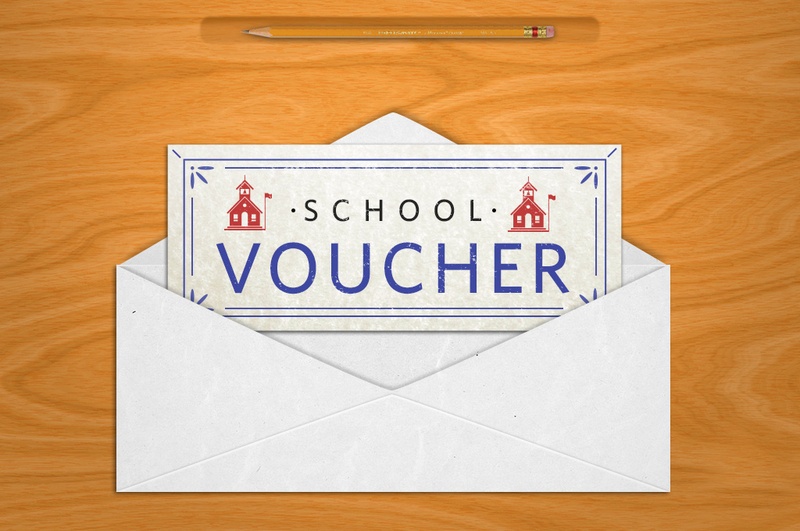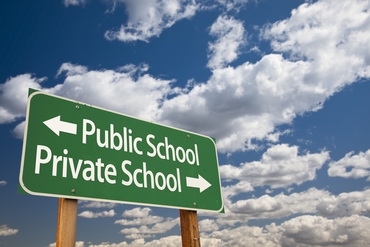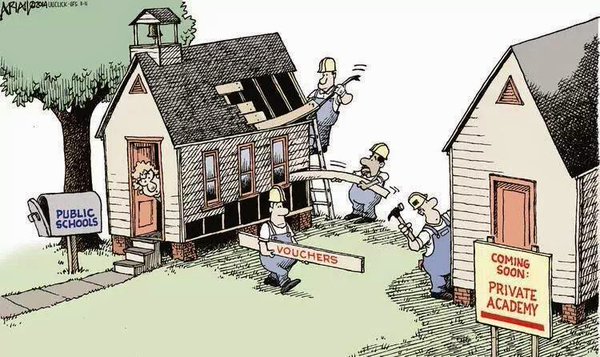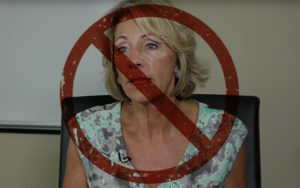
 Most people would agree that, in general, private schools perform better than public schools, but how do we know this to be true? Private schools are not required to participate in statewide assessments. I suppose you could make the assumption that if a private school isn’t producing high results, parents wouldn’t be inclined to pay enormous tuition for their children to attend.
Most people would agree that, in general, private schools perform better than public schools, but how do we know this to be true? Private schools are not required to participate in statewide assessments. I suppose you could make the assumption that if a private school isn’t producing high results, parents wouldn’t be inclined to pay enormous tuition for their children to attend.
There are exceptions. For example, the high school in which I teach serves just under 2000 students from every socio-economic status known and consistently produces the highest advanced placement results in the state. A local, top notch, private school has a tough time competing with our students; however, their college completion rate is significantly higher, simply because the demographics of their student body is much more narrow. Top performing schools, such as this one, are exactly why vouchers are so appealing to parents with children in failing schools.
In Louisiana, vouchers have been met much resistance for a couple of reasons. Several years ago, the Louisiana Federation of Teachers (LFT), Louisiana Association of Educators (LAE), and the Louisiana School Boards Association (LSBA) challenged the use of MFP money to fund vouchers. The MFP is a pool of money, with a complex distribution formula, that is constitutionally dedicated to public school students. Louisiana courts agreed that MFP money couldn’t be used to fund vouchers. In response to this decision, LDOE requested an appropriation from the legislature, outside of the MFP. This is how vouchers are currently funded; however, the money has to be requested each year, and it is subject to mid-year cuts when the state budget is running a deficit, as it is this year.
Many parents have taken advantage of the voucher program and are grateful to have this option for their children. Those in favor of vouchers say the children are doing better. Those opposed, say they are not. We don’t know because in Louisiana, a new private school cannot be opened for the sole purpose of accepting vouchers, and a private school with fewer than 40 voucher students doesn’t have to participate in state assessment; therefore, we have no data.
I would wager that overall performance of a private school with an enrollment of 300-500 students wouldn’t be drastically changed if it took in 40 voucher students; even if the 40 were low-performers. Many, many private schools have been cordial in accepting voucher students. Some even accepted students after the Baton Rouge flooding with no guarantee of a voucher. It shows that they are willing to provide opportunities to all students….because they aren’t assessed. You would have a difficult time finding a private school with more than 40 voucher students enrolled, and if you do, you can bet they were selectively enrolled.
 As you probably know, conservative reformers and liberal reformers have been working hand in hand to create choice options for parents in the form of charter schools and vouchers. With President Trump’s recent nomination of Betsy DeVos as Secretary of Education, these two reform groups have become less entangled. Why is that? Well, it is pretty simple politics. The liberal reformers, or Democrats For Education Reform (DFER), see students trapped in failing schools as a social injustice and want these students to be able to go to the school of their choice. The conservative reformers, or GOP, sees public schools as wasteful spending of a government entity that teaches liberal ideas to their children. The DFERs oppose Betsy DeVos because she will advocate for the removal of all restrictions on charter schools and vouchers, and both reform groups know what the end result will be. One side will be happy; the other, not so much.
As you probably know, conservative reformers and liberal reformers have been working hand in hand to create choice options for parents in the form of charter schools and vouchers. With President Trump’s recent nomination of Betsy DeVos as Secretary of Education, these two reform groups have become less entangled. Why is that? Well, it is pretty simple politics. The liberal reformers, or Democrats For Education Reform (DFER), see students trapped in failing schools as a social injustice and want these students to be able to go to the school of their choice. The conservative reformers, or GOP, sees public schools as wasteful spending of a government entity that teaches liberal ideas to their children. The DFERs oppose Betsy DeVos because she will advocate for the removal of all restrictions on charter schools and vouchers, and both reform groups know what the end result will be. One side will be happy; the other, not so much.
The DFERs know that removing restrictions from charter schools will open the door for “for-profit” entities to run charter schools in which profit will be the focus and lack of accountability will lead to mass corruption. They are most opposed to unrestricted access to vouchers for students; regardless of the school they attend. Many people think this is a fantastic idea, because private schools perform better, and all students will have the opportunity to perform better, right? Wrong!
Let’s take a look at the big picture of unrestricted use of vouchers. Once vouchers are made available to all students, parents who have been paying tuition for years will receive vouchers. Parents who never even thought about private school will receive vouchers. Public school enrollment will drop to almost nothing and crumble. Great! Right? Nope!
Privatization is not the endgame to vouchers. The final result of privatization will be segregation. Once vouchers are made available to all, without restriction, private schools will have to participate in statewide assessments for accountability. They will invoke enrollment standards. The very best schools will only accept the very best students to ensure that they remain the very best school. Average students and low-performing students will be on waiting lists to get into the next tier of private schools, and so on, until the lowest performing students have no choice but to enroll in the lowest performing schools. Private schools are not obligated to serve special needs populations. While it is true that some currently serve students with the mildest learning disabilities, and some serve students with moderate disabilities, when the parent is a member of their congregation. This will leave the students with the most needs having to depend on the public system that will be forced to provide services using what little federal funding they can acquire because they’ve lost the majority of their state funding.
 This, in a nutshell, is why DFERs oppose DeVos, and you should, too. I know that there are many parents out there who would be perfectly okay with this scenario. On a daily basis, I see elected officials, with no understanding of the consequences, promoting this concept simply because of their political ideology. I want to offer a thought to those people. Use your education and your influential status to push for responsible reforms that serve to improve the education of all children. I am an American, and I support free market, responsible government spending, providing social services to the most vulnerable and needy citizens, freedom to choose your religion, and the freedom to choose no religion. When you remove restrictions on vouchers and allow religious organizations to operate on taxpayer dollars, you had better be ready to allow those vouchers to go to Catholic schools, Baptist schools, Lutheran schools, Methodist schools, Non-denominational schools, Jewish schools, Hindu schools, Buddhist schools and yes, Muslim schools.
This, in a nutshell, is why DFERs oppose DeVos, and you should, too. I know that there are many parents out there who would be perfectly okay with this scenario. On a daily basis, I see elected officials, with no understanding of the consequences, promoting this concept simply because of their political ideology. I want to offer a thought to those people. Use your education and your influential status to push for responsible reforms that serve to improve the education of all children. I am an American, and I support free market, responsible government spending, providing social services to the most vulnerable and needy citizens, freedom to choose your religion, and the freedom to choose no religion. When you remove restrictions on vouchers and allow religious organizations to operate on taxpayer dollars, you had better be ready to allow those vouchers to go to Catholic schools, Baptist schools, Lutheran schools, Methodist schools, Non-denominational schools, Jewish schools, Hindu schools, Buddhist schools and yes, Muslim schools.
Think about that for a moment. I am willing to bet there are a whole lot of taxpayers out there, with and without school-aged children, that would not approve of their tax dollars supporting religious schools contrary to their own beliefs.
Click here to Support your local Public Schools!

